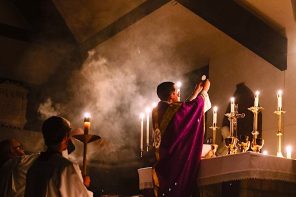Ross Douthat’s recent column, seemingly reasoned and innocuous, asserts a shallow read of American viewpoints of Islam and highlights the “high-minded” America that fully embraces first amendment protections for individuals and religious groups, while simultaneously arguing favorably that a one true America identity exists, one rife with the language of intolerance, fear, xenophobia. He sugarcoats anti-Islamic sentiments for a constituency that should have no say in a largely local matter under the guise of a “fair-minded” recounting of American culture and history. He acknowledges the marginalization of Catholics yet ignores vile acts of intimidation and compulsory pressures for assimilation by immigrant groups from Eastern Europe, a great many whom were Jewish. And to boot, he dismisses the plurality that already existed on these shores in the fact of the transatlantic slave trade and the native population present at the birth of our nation.
Discussing the proposed construction of the Cordoba House project in Lower Manhattan, Douthat writes:
There’s an America where it doesn’t matter what language you speak, what god you worship, or how deep your New World roots run…But there’s another America as well, one that understands itself as a distinctive culture, rather than just a set of political propositions. This America speaks English, not Spanish or Chinese or Arabic. It looks back to a particular religious heritage: Protestantism originally, and then a Judeo-Christian consensus that accommodated Jews and Catholics as well.
The subtext is neither subtle or nuanced — it’s sinister. On the surface, he seems to be favoring the best of us, the America where civic virtue thrives and religious freedom is right for all those who are born and naturalized here, but sympathizes with a group of Americans who seem to be ignorant of our origins, our journey in creating these laws to protect the rights of individuals and minority groups who came here to escape persecution. He’s talking out of both sides of his mouth: scapegoating American Muslims and demanding renunciations of extremism in Islam yet sanctioning extremism in the conservative movement.
The American Prospect’s Jamelle Bouie also notes the following, a backgrounder of sorts for the themes highlighted in Mark Bergen’s coverage in RD:
Douthat suggests that the Cordoba House is under attack because its critics want Muslims to be “more American.” But that’s bullshit; [they] aren’t attacking Cordoba out of some misplaced sense of inclusion; they are attacking it because like their 19th-century forebears they see Muslims as “injurious to our national character.” To those demagogues, America simply doesn’t have room for Muslims.
The week after the Towers fell, we returned to work to a disemboweled Fulton Street in Lower Manhattan. During lunch I gathered enough emotional courage to view the ruins through the narrow way of Dey Street. Trinity Church, its courtyard and cemetery, were completely covered in dust and debris. The crowd along Broadway huddled solemnly between and considered the shell of Two World Trade and the tremendous loss of human life. There were no tourists there, just workers, from banks, stock exchange, city agencies, restaurants, and retail stores.
We returned to work during Days of Awe, the first ten days of the Jewish New Year marked by Rosh Hashanah and Yom Kippur. The commissioner and a several others organized a memorial and interfaith prayer service at St. Andrew’s Church. A rabbi, a priest, and an imam. A crowded sanctuary of city employees of Chinese, Nigerian, German, Italian, Irish descent. Jewish, Sikh, Buddhist, Christian, Muslim. A gorgeous mosaic. We were all New Yorkers, and we were all Americans. We were mourning a great loss. We prayed for the dead. We prayed for the survivors. We prayed for peace.
However, the narrative of 9/11 for many others is at odds with the average New Yorker. Many have watched video the towers fall repeatedly, have a sophistic understanding of New York City, its people, and its geography. They seemingly can relate to the greatest tragedy in our recent history yet fail to comprehend the cosmopolitan culture that exists here.
Exploiting the narrative of 9/11 to appeal to some homogeneous elements of the electorate and their fears of the “other” is as vile as Andrew Breitbart’s defamation of Shirley Sherrod. In Douthat’s binary on America, he ostensibly negates the fact of my existence and my Americanness. Conjuring the romanticism of the founding of America and employing language that whitewashes immigrant and native peoples of color is as insidious as it is divisive. His mark of Americanness is distilled to a monolithic whiteness. America’s isn’t a white Anglo-Saxon Protestant story in its totality, if we’re being honest about our origins and our future. Americanness is far more expansive than that.
Douthat’s veiled reasoning on assimilation in American history is an opiate for an ugly trend dominating our national conversation. It’s a convenient and blissfully ignorant reading of history in uncertain times.




